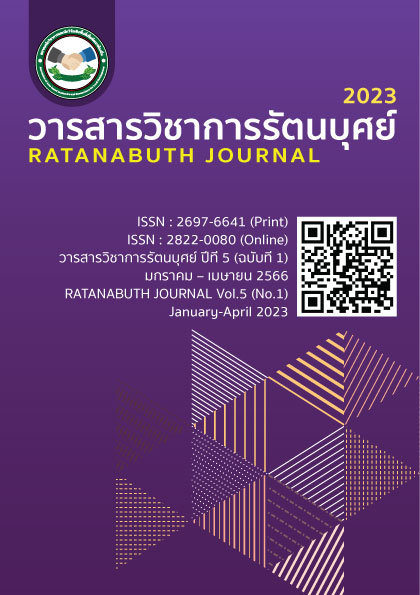Development of Lifelong Learning Indicators of Teachers Under Nong Bua Lamphu Province Development of Lifelong Learning Indicators of Teachers Under Nong Bua Lamphu Province
Main Article Content
Abstract
The purposes of this research were to develop indicator and check the consistency of the model of Lifelong Learning indicators of teachers under Nong Bua Lamphu. Province comply with empirical data. The sample group for this study consisted of 460 teachers who taught under the office of the Nong Bua Lamphu Primary and Secondary education service area office by using Stratified random sampling the tools used in the research were five-level scale, 23 items. The reliability of questionnaire was at 0.976 statistics used in the analysis include: The percentage, mean, standard deviation, Pearson correlation and confirmatory factor analysis were the parameters used for statistical analysis.
The results revealed that ; (1) the development of indicator for Lifelong Learning of teachers in Nong Bua Lamphu consisted of 5 factors and 23 indicators, Knowledge-Seeking Mind Comprising 4 indicators, Analysis Thinking Comprising 4 indicators, Collaborative Learning Comprising 4 indicators, Purposeful Self-Learning 5 indicators, and Learning Skills Comprising 6 indicators. The highest ranked factor loading was Knowledge-seeking mind comprising. (2) Lifelong Learning indicator model of teachers under Nong Bua Lamphu conformed to empirical data. (Chi-square=97.66, df = 139, P = 0.997, GFI = 0.98, AGFI = 0.96, RMSEA = 0.000)
Article Details

This work is licensed under a Creative Commons Attribution-NonCommercial-NoDerivatives 4.0 International License.
References
กัลยา วานิชย์บัญชา. (2556). การวิเคราะห์ความถดถอยและสหสัมพันธ์เชิงซ้อน. พิมพ์ครั้งที่ 14.กรุงเทพฯ: โรงพิมพ์แห่งจุฬาลงกรณ์ มหาวิทยาลัย.
ไกศิษฏ์ เปลรินทร์. (2552). การพัฒนาตัวบ่งชี้ภาวะผู้นำทางวิชาการสำหรับผู้บริหาร สถานศึกษาขั้นพื้นฐาน. วิทยานิพนธ์ ศษ.ด. ขอนแก่น: มหาวิทยาลัยขอนแก่น.
จิตต์ภิญญา ชุมสาย ณ อยุธยา. (2551). ลักษณะผู้เรียนรู้ตลอดชีวิตของนิสิตนักศึกษาระดับปริญญาตรี ชั้นปีสุดท้าย. วิทยานิพนธ์ปริญญาดุษฎีบัณฑิต, สาขาวิชาการอุดมศึกษา บัณฑิตวิทยาลัย มหาวิทยาลัยศรีนครินทรวิโรฒ.
จุลศักดิ์ สุขสบาย และคณะ.(2560). การพัฒนาแบบวัดคุณลักษณะผู้เรียนรู้ตลอดชีวิตของนักเรียนระดับประถมศึกษาปีที่ 4-6.วารสารเกษมบัณฑิต.18 (1): 162-174.
นงลักษณ์ วิรัชชัย. (2542). โมเดลลิสเรล : สถิติวิเคราะห์สำหรับการวิจัย.พิมพ์ครั้งที่ 3. กรุงเทพมหานคร : โรงพิมพ์จุฬาลงกรณ์มหาวิทยาลัย.
นิด้าโพล. (2561). ครู/อาจารย์ และการศึกษาไทยในปัจจุบัน. สืบค้นเมื่อ 29 สิงหาคม 2562 จาก https://nidapoll.nida.ac.th/data/survey/uploads/FILE-1598235091790.pdf.
สมเกียรติ ทานอก. (2539). การพัฒนาตัวบ่งชี้รวมสาหรับเกณฑ์มาตรฐานโรงเรียน ประถมศึกษา. กรุงเทพฯ : จุฬาลงกรณ์มหาวิทยาลัย.
สุมาลี สังข์ศรี. (2544). รายงานการวิจัยการศึกษาตลอดชีวิตเพื่อพัฒนาสังคมไทยในศตวรรษที่ 21. กรุงเทพมหานคร : สำนักงานคณะกรรมการศึกษาแห่งชาติ.
สุมาลี สังข์ศรี. (2555). รูปแบบการจัดการศึกษาตลอดชีวิตสำหรับกลุ่มเกษตรกรในสังคมไทย.(ฉบับที่ 2)นนทบุรี : วารสารสุโขทัยธรรมาธิราช ปีที่ 25.
สุชาติ ประสิทธิ์รัฐสินธุ์. (2548). การใช้สถิติในงานวิจัยอย่างถูกต้องและได้มาตรฐานสากล. พิมพ์ครั้งที่ 4. กรุงเทพฯ : สามลดา.
สุรศักดิ์ หลาบมาลา และรสสุคนธ์ มกรมณี. (2549) .การศึกษาเปรียบเทียบการพัฒนาการศึกษา ไทยกับนานาชาติ : นวัตกรรมการเรียนรู้ตลอดชีวิตเพื่อยกระดับการศึกษาแรงงานไทย. กรุงเทพมหานคร : พริกหวานกราฟฟิค.
สำนักงานคณะกรรมการพัฒนาเศรษฐกิจและสังคมแห่งชาติ. (2559). แผนพัฒนาเศรษฐกิจและสังคมแห่งชาติ ฉบับที่ 12 (พ.ศ.2560-2564). กรุงเทพมหานคร : สำนักงานฯ.
สำนักงานศึกษาธิการจังหวัดหนองบัวลำภู. (2562). ข้อมูลครูและบุคลากร. สืบค้นเมื่อ 29 สิงหาคม 2562 จาก http://www.nbppeo.go.th/nbp/บริการออนไลน์/ข้อมูลครูและนักเรียน.
อาชัญญา รัตนอุบล และคณะ. (2557). การศึกษาและการเรียนรู้ตลอดชีวิต = Lifelong education and lifelong learning, พิมพ์ครั้งที่ 1. กรุงเทพมหานคร : สำนักพิมพ์แห่งจุฬาลงกรณ์มหาวิทยาลัย
Candy, P.C., Crebert, R.G. , and O ' Leary,J. (1994 Developing lifelong learners Through under graduate education. Australian Government Publishing Service [online]. สืบค้นเมื่อ : 29 สิงหาคม 2562 จากhttp://www.dest.gov.au/NR/rdonlyres/AF55BDE9-B90B-466C-A7C8E938D1515C46/3933/94_21.pdf.
Knapper, C.K., and Cropley, A.J. (2000). Lifelong learning in higher education. 3rd ed. London: Kogan Page Limited.
Skager, R., and Dave, R. H. (1977).Curriculum evaluation for lifelong education. Toronto: Pergamon Press.
UNESCO Institute for Lifelong Learning. (2017). History of the Institute. สืบค้นเมื่อ 29 สิงหาคม 2562, จาก http://uil.unesco.org/unesco- institute/history.


